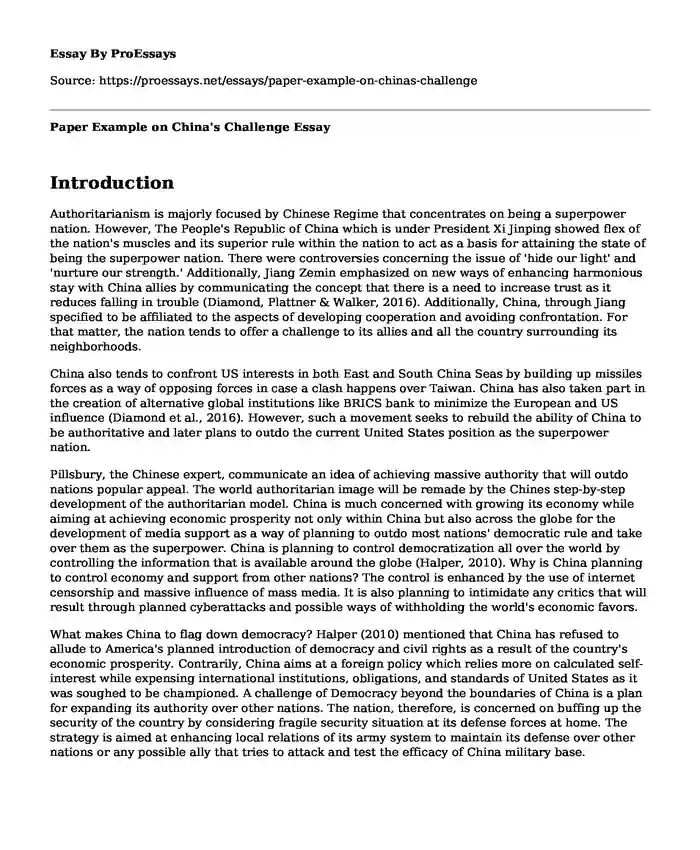Introduction
Authoritarianism is majorly focused by Chinese Regime that concentrates on being a superpower nation. However, The People's Republic of China which is under President Xi Jinping showed flex of the nation's muscles and its superior rule within the nation to act as a basis for attaining the state of being the superpower nation. There were controversies concerning the issue of 'hide our light' and 'nurture our strength.' Additionally, Jiang Zemin emphasized on new ways of enhancing harmonious stay with China allies by communicating the concept that there is a need to increase trust as it reduces falling in trouble (Diamond, Plattner & Walker, 2016). Additionally, China, through Jiang specified to be affiliated to the aspects of developing cooperation and avoiding confrontation. For that matter, the nation tends to offer a challenge to its allies and all the country surrounding its neighborhoods.
China also tends to confront US interests in both East and South China Seas by building up missiles forces as a way of opposing forces in case a clash happens over Taiwan. China has also taken part in the creation of alternative global institutions like BRICS bank to minimize the European and US influence (Diamond et al., 2016). However, such a movement seeks to rebuild the ability of China to be authoritative and later plans to outdo the current United States position as the superpower nation.
Pillsbury, the Chinese expert, communicate an idea of achieving massive authority that will outdo nations popular appeal. The world authoritarian image will be remade by the Chines step-by-step development of the authoritarian model. China is much concerned with growing its economy while aiming at achieving economic prosperity not only within China but also across the globe for the development of media support as a way of planning to outdo most nations' democratic rule and take over them as the superpower. China is planning to control democratization all over the world by controlling the information that is available around the globe (Halper, 2010). Why is China planning to control economy and support from other nations? The control is enhanced by the use of internet censorship and massive influence of mass media. It is also planning to intimidate any critics that will result through planned cyberattacks and possible ways of withholding the world's economic favors.
What makes China to flag down democracy? Halper (2010) mentioned that China has refused to allude to America's planned introduction of democracy and civil rights as a result of the country's economic prosperity. Contrarily, China aims at a foreign policy which relies more on calculated self-interest while expensing international institutions, obligations, and standards of United States as it was soughed to be championed. A challenge of Democracy beyond the boundaries of China is a plan for expanding its authority over other nations. The nation, therefore, is concerned on buffing up the security of the country by considering fragile security situation at its defense forces at home. The strategy is aimed at enhancing local relations of its army system to maintain its defense over other nations or any possible ally that tries to attack and test the efficacy of China military base.
Conclusion
The relations that China might develop between the two-dozen countries neighboring the nation should be a worry. Halper (2010) communicated that countries like Japan, Vietnam, North Korea and India might the first target for China to launch its massive cyber-attack. The matter seems to be connected to maintain a relaxed environment within its borders while planning to start authoritative commands on the nations that it does not have diplomatic relations with it.
References
Diamond, L., Plattner, M. F., & Walker, C. (Eds.). (2016). Authoritarianism goes global: The challenge to democracy. JHU Press.
Halper, S. (2010). The Beijing consensus: how China's authoritarian model will dominate the twenty-first century. ReadHowYouWant. com.
Cite this page
Paper Example on China's Challenge. (2022, May 16). Retrieved from https://proessays.net/essays/paper-example-on-chinas-challenge
If you are the original author of this essay and no longer wish to have it published on the ProEssays website, please click below to request its removal:
- Why Felons Voting Right Laws Should Change
- Effects of the Constitution on Homeland Security Essay Example
- Ministry Model and Leadership Styles Paper Example
- Paper Example on Governance: Key to Country's Success
- Annotated Bibliography on Katrina's Impact on New Orleans
- Essay on Tension Between Private and Public Policing: Budgetary Challenges and Collaboration
- Free Essay Example on Law & Sovereignty: Native American Tribes & U.S. Government







